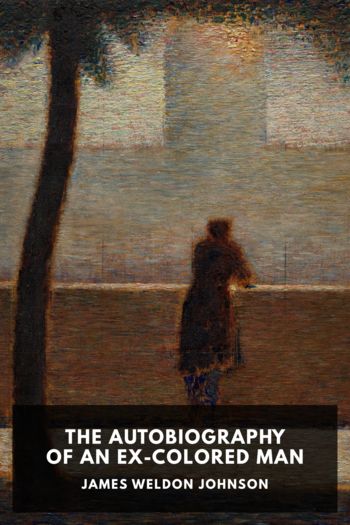The Autobiography of an Ex-Colored Man - James Weldon Johnson (best classic books of all time txt) 📗

- Author: James Weldon Johnson
Book online «The Autobiography of an Ex-Colored Man - James Weldon Johnson (best classic books of all time txt) 📗». Author James Weldon Johnson
We at length secured places at a table in a corner of the room and, as soon as we could attract the attention of one of the busy waiters, ordered a round of drinks. When I had somewhat collected my senses, I realized that in a large back room into which the main room opened, there was a young fellow singing a song, accompanied on the piano by a short, thickset, dark man. After each verse he did some dance steps, which brought forth great applause and a shower of small coins at his feet. After the singer had responded to a rousing encore, the stout man at the piano began to run his fingers up and down the keyboard. This he did in a manner which indicated that he was master of a good deal of technique. Then he began to play; and such playing! I stopped talking to listen. It was music of a kind I had never heard before. It was music that demanded physical response, patting of the feet, drumming of the fingers, or nodding of the head in time with the beat. The barbaric harmonies, the audacious resolutions, often consisting of an abrupt jump from one key to another, the intricate rhythms in which the accents fell in the most unexpected places, but in which the beat was never lost, produced a most curious effect. And, too, the player—the dexterity of his left hand in making rapid octave runs and jumps was little short of marvelous; and with his right hand he frequently swept half the keyboard with clean-cut chromatics which he fitted in so nicely as never to fail to arouse in his listeners a sort of pleasant surprise at the accomplishment of the feat.
This was ragtime music, then a novelty in New York, and just growing to be a rage, which has not yet subsided. It was originated in the questionable resorts about Memphis and St. Louis by Negro piano players who knew no more of the theory of music than they did of the theory of the universe, but were guided by natural musical instinct and talent. It made its way to Chicago, where it was popular some time before it reached New York. These players often improvised crude and, at times, vulgar words to fit the melodies. This was the beginning of the ragtime song. Several of these improvisations were taken down by white men, the words slightly altered, and published under the names of the arrangers. They sprang into immediate popularity and earned small fortunes, of which the Negro originators got only a few dollars. But I have learned that since that time a number of colored men, of not only musical talent, but training, are writing out their own melodies and words and reaping the reward of their work. I have learned also that they have a large number of white imitators and adulterators.
American musicians, instead of investigating ragtime, attempt to ignore it, or dismiss it with a contemptuous word. But that has always been the course of scholasticism in every branch of art. Whatever new thing the people like is pooh-poohed; whatever is popular is spoken of as not worth the while. The fact is, nothing great or enduring, especially in music, has ever sprung full-fledged and unprecedented from the brain of any master; the best that he gives to the world he gathers from the hearts of the people, and runs it through the alembic of his genius. In spite of the bans which musicians and music teachers have placed upon it, the people still demand and enjoy ragtime. One thing cannot be denied, it is music which possesses at least one strong element of greatness: it appeals universally; not only the American, but the English, the French, and even the German people find delight in it. In fact, there is not a corner of the civilized world in which it is not known, and this proves its originality; for if it were an imitation, the people of Europe anyhow would not have found it a novelty. Anyone who doubts that there is a peculiar heel-tickling, smile-provoking, joy-awakening charm in ragtime needs only to hear a skillful performer play the genuine article to be convinced. I believe that it has its place as well as the music which draws from us sighs and tears.
I became so interested in both the music and the player that I left the table where I was sitting, and made my way through the hall into the back room, where I could see as well as hear. I talked to the piano-player between the musical numbers and found out that he was just a natural musician, never having taken a lesson in his life. Not only could he play almost anything he heard, but he could accompany singers in songs he had never heard. He had, by ear alone, composed some pieces, several of which he played over for me; each of them was properly proportioned and balanced. I began to wonder what this man with such a lavish natural endowment would have done had he been trained. Perhaps he wouldn’t have done anything at all; he might have become, at best, a mediocre imitator of the great masters in what they have





Comments (0)